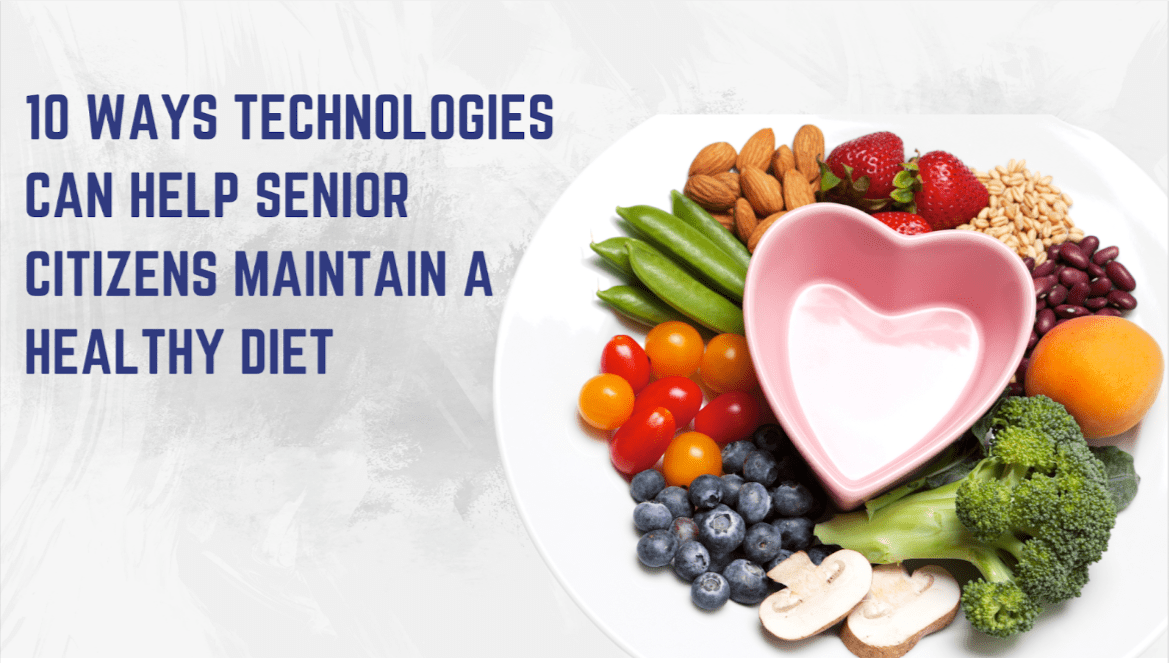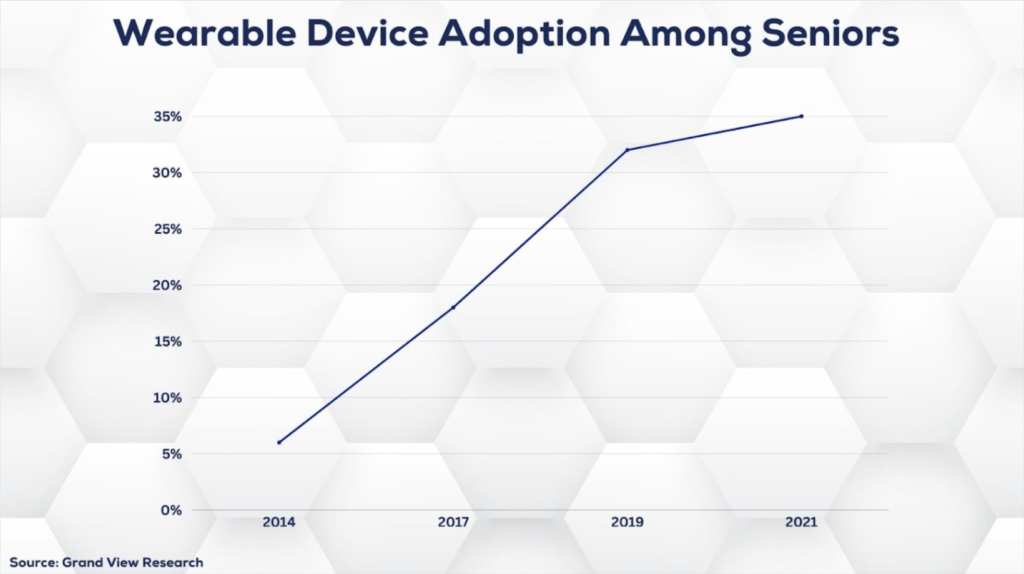
Maintaining a healthy diet is crucial at any age, but it becomes particularly vital for seniors. As we grow older, our dietary needs change along with our lifestyles. That’s where technology steps in, providing innovative solutions to empower seniors to make nutritious choices. From smart kitchen gadgets to wearable devices and beyond, technology is transforming senior diets for the better.
Smart Kitchen Appliances
With the smart home market booming, seniors are welcoming technology into their kitchens. Smart refrigerators now offer features like cameras inside to view contents remotely, sensors to track expiration dates, and systems to create grocery lists automatically.
As the smart kitchen appliances market is expected to reach $40.7 billion by 2027, these devices are streamlining meal preparation for tech-savvy seniors.
Smart ovens also make cooking safer and simpler. Their automatic settings, food thermometers, and built-in cameras enable seniors to achieve the perfect meal with minimal effort.
Incorporating these technologies into daily life not only encourages healthier eating habits but also contributes to overall wellness.
Seeking guidance from professionals in adult primary care can enhance the effectiveness of these technological interventions. A primary care doctor can provide personalized advice, taking into account individual health conditions and dietary restrictions.
Meal Delivery Services
Seniors short on time or energy can outsource meal prep to meal delivery services, which are booming in popularity. These subscriptions offer pre-made meals tailored to virtually any dietary need, from diabetes-friendly to heart-healthy. With the meal kit delivery market projected to grow at 13.0% CAGR from 2021-2028, services make eating healthy as easy as opening the fridge.
Delivering perfectly portioned, nutrient-dense dishes right to seniors’ doorsteps, these services eliminate grocery shopping and cooking obstacles. Their convenience and customization explain why they are appealing to over a million U.S. seniors and counting.
Mobile Apps for Nutrition Tracking
For seniors who still relish grocery shopping and cooking, nutrition tracking apps help them make the healthiest choices. These apps offer extensive food databases plus barcode scanners to look up the nutrition information on packaged goods. Health and fitness app usage among seniors increases by 34% yearly. These mobile aids ensure that tech-savvy seniors meet their nutritional needs.
By tracking nutrients such as protein, fats, carbohydrates, vitamins, and minerals, these apps empower seniors to effortlessly address any nutritional deficiencies or excesses. GUIDEA is one senior-tailored option, providing recipes and meal plans alongside progress tracking for a comprehensive solution.
Top 5 Nutrition Tracking Apps for Seniors
| Apps | Features |
| GUIDEA | Customizable recipes and meal plans,plans; progress dashboard |
| MyFitnessPal | Extensive database, barcode scanner, and recipes |
| Lose It! | Macros and calorie tracking, social community |
| Cronometer | Micronutrient tracking, Apple Health sync |
| MyNetDiary | Ads diabetes-friendly options, medication logging |
Wearable Health Devices
Beyond smartphones, seniors are now using wearable devices on their wrists to gain insights into their dietary health. Smartwatches and fitness trackers now provide not only step counts but also calorie burn estimates, heart rate variability tracking, sleep monitoring, and more nutrition-related metrics.

With the global wearable fitness tech market reaching $74.9 billion by 2021, seniors have a wealth of data guiding healthier diets at their fingertips.
For seniors who are focused on losing or maintaining weight, wearables provide accountability by revealing the connections between diet, exercise, and weight fluctuations. They also often integrate with popular nutrition apps for comprehensive tracking. Far more than just pedometers, today’s wearables deliver a 360-degree view of wellness to diet-conscious seniors.
Online Recipe Resources
Seniors following special diets amid health conditions like diabetes or heart disease once relied on analog cookbooks with limited options. But online recipe platforms offer limitless variety while catering recipes to virtually any restriction. During the pandemic, recipe website traffic surged by 42% driven partly by seniors seeking new meal ideas for their dietary needs.
Websites like AllRecipes and Epicurious enable seniors to filter for keywords like gluten-free or low-sodium while tailoring serving sizes suitably for one or two. Meal planning apps like KetoDiet take personalization further by auto-generating weekly meal plans integrating user preferences and nutritional requirements.
Virtual Nutrition Coaching
While DIY online resources can be invaluable, some seniors benefit from personalized nutrition coaching. The 300% uptick in senior telehealth usage in 2020 shows virtual coaching’s appeal for dietary guidance. These consultations connect elderly clients with nutrition experts conveniently via phone or video chat.
With their holistic health insights, coaches create personalized meal plans while addressing diet-related questions. Sessions often involve setting nutritional goals, overcoming hurdles like diminished sense of taste or appetite, introducing vitamin supplements if required, and finding recipes that balance enjoyment and nutrition. By conveniently connecting seniors with professional expertise, virtual coaching promotes healthy, sustainable dietary habits.
Medication Management Apps
Seniors take more prescriptions than any other age group, with over 66% managing four or more medications daily. This polypharmacy makes adverse drug interactions likely, some triggering nutritional issues like potassium deficiency, nausea, or loss of appetite. This explains why medication non-adherence accounts for 80% of senior hospitalizations.
Fortunately, medication management apps help prevent complications by tracking seniors’ medication schedules, inventories, and adherence while providing medication and food interaction alerts.
By integrating medication data with diet details, leading options like MyTherapy enable seniors to make food choices minimizing interactions. These apps address non-adherence, making it easier for seniors to follow their complex medication regimens and maintain proper nutrition.
Grocery Shopping Apps
Grocery delivery saw monumental growth during pandemic, with online grocery sales expected to account for 21.5% of total sales by 2025. Seniors embraced grocery apps appreciating conveniences like no-contact delivery and order tracking. But they also emphasize dietary preferences, from organic produce to low-carb snacks.
Options like Instacart and Walmart Grocery are tailored to these needs with senior-friendly interfaces, real-time inventory checks at local stores, and tools filtering for dietary tags like gluten-free.
Simplifying nutrition tracking from store to plate, lists can also auto-populate with favorites or suggested items personalized through past purchase data, quiz responses, and more. These apps make sticking to special diets while grocery shopping almost effortless for seniors.
Social Engagement Platforms
Research reveals loneliness and isolation significantly increase senior malnutrition risk. But social media usage among seniors rose by 20% in five years, with online groups uniting seniors around common interests, which include healthy home cooking. Facebook groups like Eat Better Together and recipe-sharing platforms like Cookpad foster community while supporting nutrition goals through peer advice and inspiration.
Through comments, forums, and live events, these social networks combat malnutrition risk factors and isolation while empowering seniors to prepare nutritious, appealing meals at home.
Conclusion
Maintaining adequate nutrition is essential yet increasingly challenging for seniors facing evolving dietary needs, limited mobility, and more. However, innovative technologies offer solutions tailored to virtually any obstacle, from simplified meal-prepping tools to nutrition tracking resources to apps for convenient, healthy grocery ordering.
While smart kitchen gadgets and nutrition apps help seniors form healthy habits themselves, options like meal delivery, virtual coaching, and online support groups provide personalized guidance. Embracing these technologies assists seniors in overcoming dietary challenges, ultimately leading to improved nutrition, an enhanced health span, and a better quality of life.



